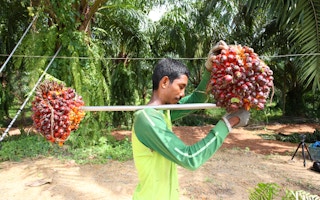Major stakeholder groups in the palm oil sector found some common ground and issued a set of recommendations to improve the sector at the Responsible Business Forum on Sustainable Development in Singapore on Tuesday.
To continue reading, subscribe to Eco‑Business.
There's something for everyone. We offer a range of subscription plans.
- Access our stories and receive our Insights Weekly newsletter with the free EB Member plan.
- Unlock unlimited access to our content and archive with EB Circle.
- Publish your content with EB Premium.
The likes of Singapore-listed palm oil firm Wilmar International, the Roundtable on Sustainable Palm Oil (RSPO), the Zoological Society of London, and even Greenpeace International, agreed that a multi-pronged approach is needed to address the complex issues surrounding the production of palm oil, especially in the areas of illegal forest clearances, trans-boundary haze, supply chain transparency, low certified sustainable palm oil uptake and government regulations.
The recommendations made by the group included increasing the quality and quantity of available information to allow the transparency of data available and the traceability on the processes and products available, and developing incentives for sustainable plantations across the sector.
Choi Shing Kwok, Permanent Secretary, Ministry for Environment and Water Resources in Singapore, said, “There is no single silver bullet to solve the challenges of palm oil sustainability.” All stakeholders must move on all aspects if any significant change is to be achieved, he added.
The minister, together with representatives from the academe, palm oil companies, industry associations and non-government organisations, formed the five-member palm oil panel at the working group sessions of the forum, held at the Marina Bay Sands.
The two-day conference, which focused on the theme of “Transformation, Growth, and the Green Economy”, gathered 500 local and international delegates, who separated into different working groups to discuss issues and formulate solutions across six sectors highly relevant to Asia, namely: agriculture and forestry, financial services, consumer goods, energy, building and urban infrastructure, and palm oil.
According to Choi, who represented the government in the palm oil panel, market failures and the high demand for palm oil around the world have put the industry under the spotlight of sustainable and economic development.
In particular, one major market failure he cited is how growers scrimp on operational costs by opting for burning practices to clear land for palm oil plantations. They save money and increase their profits at the expense of nature, he explained.
Such practices caused the worst haze crisis in Singapore and Malaysia earlier in June this year, which in turn has prompted neighbouring governments to seek further action to eradicate the annually recurring pollution.
“
One area that needs immediate cooperation is for the establishment of a consistent mapping system… Currently, varying maps make it difficult to identify concessions with fire hotspots
However, there is a “disconnect between what governments want and what businesses can do”, said Jeremy Goon, a panellist and group head for sustainability of Wilmar, the biggest palm oil processing firm worldwide.
For example, he explained that in the case of high conservation value (HCV) forests found in concession areas, the company wants to preserve the land but the government will see it as being unused, allowing them to exercise their prerogative to take the area back and give it to another firm that may not be as sustainably committed.
In addition, there is the existence of multiple sustainability standards, noted Ken Richards, professor on sustainability at the National University of Singapore and chair of the panel.
These conflicting interests, together with those from the growing number of smallholder farmers and conversely, the consumers’ lack of awareness, hinder the improvement of the palm oil industry, pointed out both panellists and participants.
To move forward, there must be better collaboration between all stakeholders, such as government to government, government to companies, and companies to non-government organisations.
In fact, one area that needs immediate cooperation is for the establishment of a consistent mapping system, the working group noted. Currently, varying maps make it difficult to identify concessions with fire hotspots. As a result, identifying companies responsible for malpractices and making them answerable for environmental degradation is challenging.
The working group also noted that the collaboration must translate to better customer awareness: educating the public on the implications of unsustainable palm oil, the consumer products that use palm oil, and eventually getting them to demand better products that are manufactured in an eco-friendly manner, from one end of the supply chain to the other.
And as much as challenges continue, it is likewise important to communicate successes within the industry, they emphasised.
The other recommendations they outlined include: financial institutions should set-up benchmarks for investing in proper palm oil plantations, and developing and training smallholder farmers as well as monitoring their operations.
Farmers who are taught to implement sound environmental practices gain a boost in their productivity, eliminating the need to resort to cheap burning activities, said Sebastian Sharp, a member of the panel and head of investor relations at BW Plantations, who detailed how their young Indonesian palm oil firm manages smallholder farmers to produce quality and sustainable palm oil.
Stefano Savi, RSPO communications manager, told the group that all these proposals are already embedded in the RSPO.
Still, the discussion was “too broad and general”, Bustar Maitar, Greenpeace International’s head for the Indonesia forest campaign, told Eco-Business.
“It did not really address the issue on the ground. We need to be more ambitious to address deforestation issue… Sustainability is one thing but dealing with rapid deforestation is another. What I expected is a declaration for no deforestation in all supply chain, no peatland clearance and no exploitation.”
He added, “It’s clear that the message from the conference is we need to do more but it seems very little came out from the discussion.”
Nonetheless, Savi encouraged the participants of the working group to act.
“Let’s move this, let us not fight anymore”, he said.












